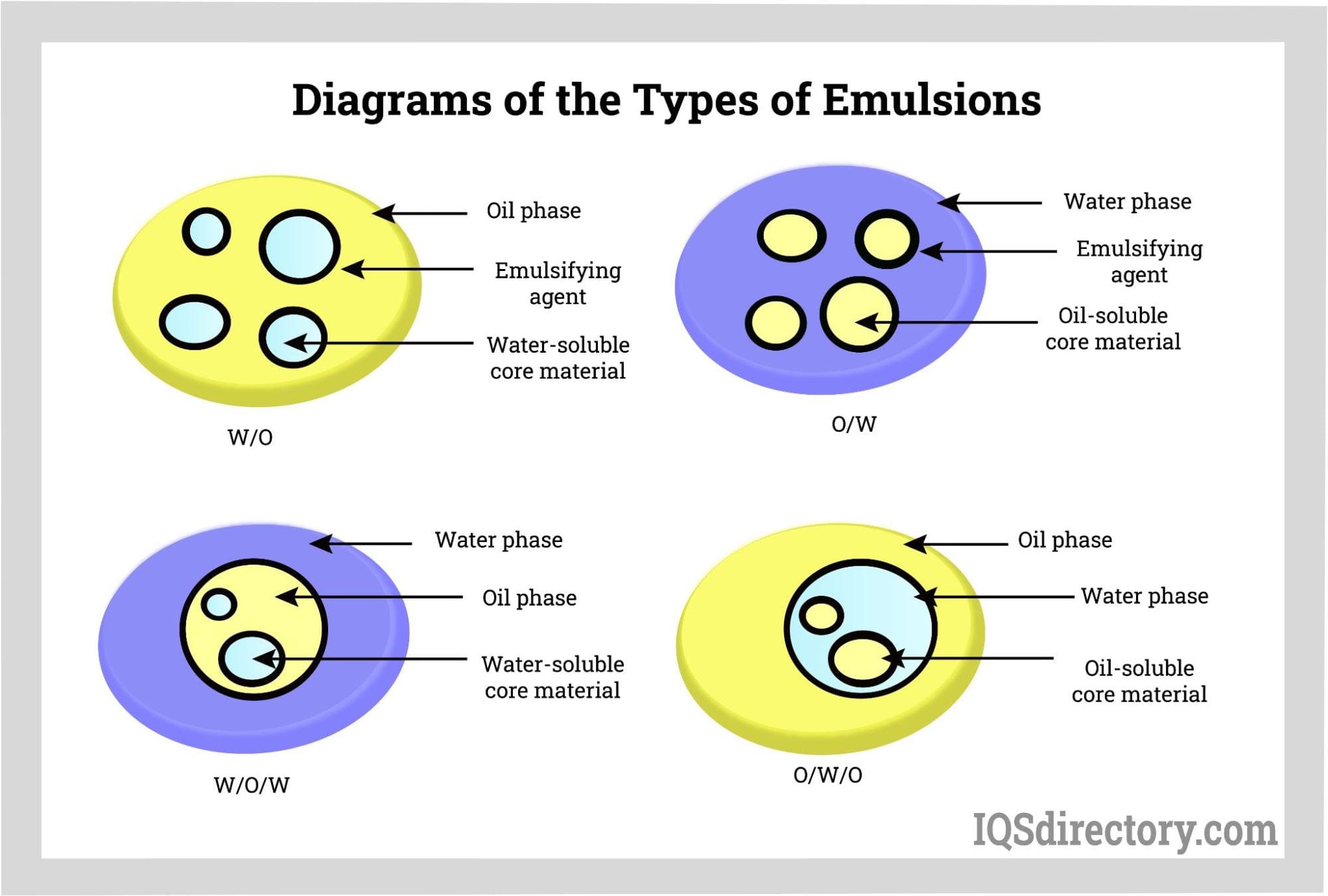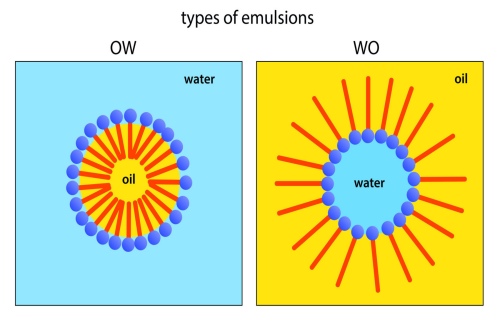Emulsifiers Explained: What They Are and Why They Matter
Emulsifiers Explained: What They Are and Why They Matter
Blog Article
The Scientific research Behind Emulsifiers and Their Relevance in Modern Production
Emulsifiers play an important role in modern-day production, acting as the unsung heroes that mix oil and water for a broad range of items. As customer choices shift towards cleaner tags, the demand for ingenious emulsifiers is expanding.
What Are Emulsifiers?
Emulsifiers are essential representatives on the planet of food and item manufacturing, working as the glue that binds 2 otherwise immiscible fluids, like oil and water. You may not understand it, however these substances play a vital function in producing stable blends. They reduce the surface area tension in between these liquids, permitting them to blend effortlessly. Typical examples consist of lecithin found in egg yolks and soybeans, and mono- and diglycerides used in various refined foods.

When you work up a salad dressing or delight in a velvety dessert, emulsifiers aid maintain that ideal structure. They ensure your items have a regular mouthfeel and appearance, improving your total experience. Without emulsifiers, many foods would separate, resulting in unwanted textures and flavors. So, next time you delight in a smooth sauce or spread, keep in mind the unrecognized heroes-- emulsifiers-- that make it all feasible.
The Chemistry of Emulsification
When you blend oil and water, you may observe they do not mix conveniently; that's where the chemistry of emulsification comes into play. Emulsification takes place when little beads of one liquid disperse in another, creating a secure combination. This takes place due to the fact that oil and water are immiscible because of their differing polarities-- water is polar while oil is non-polar. To overcome this challenge, emulsifiers are utilized.
These molecules have a hydrophilic (water-attracting) head and a hydrophobic (water-repelling) tail. When you include an emulsifier, its particles position themselves at the oil-water user interface, reducing surface area tension and enabling the droplets to mix. The emulsifier forms a protective layer around each bead, avoiding them from coalescing back right into separate layers. Understanding this chemistry is important for achieving security in items like dressings, creams, and sauces, making emulsification necessary in contemporary production.
Kinds of Emulsifiers
Numerous types of emulsifiers play necessary roles in supporting combinations of oil and water. Natural emulsifiers, like lecithin from egg yolks or soy, are obtained from plants and animals, making them preferred in food products.
On the other hand, artificial emulsifiers, such as mono- and diglycerides, are chemically engineered to enhance security and life span. They're typically utilized in refined foods and cosmetic products.
In addition, you might stumble upon non-ionic, anionic, and cationic emulsifiers, each with distinct buildings that affect their performance. Non-ionic emulsifiers, as an example, work well in a large range of pH degrees, while anionic emulsifiers tend to carry out far better in alkaline conditions. Recognizing these types can help you select the ideal emulsifier for your specific application.
Systems of Solution Development
Comprehending exactly how emulsions develop is necessary for producing steady mixes of oil and water. When you introduce an emulsifier, it decreases the surface stress in between the 2 fluids, enabling them to mix more conveniently.
The emulsifier particles have a hydrophilic (water-attracting) head and a hydrophobic (oil-attracting) tail. When you add an emulsifier, these particles prepare themselves at the oil-water interface.
Applications of Emulsifiers in Numerous Industries
Emulsifiers play a crucial role you could check here throughout various industries, making your favored foods smoother and a lot more enjoyable. In cosmetics, they boost product appearance and stability, ensuring a positive application experience. Plus, in drugs, they help supply important active ingredients successfully, improving total efficacy.
Food Market Uses
While you may not understand it, emulsifiers play an important function in the food market, improving the structure, stability, and rack life of numerous products. In baked goods, emulsifiers improve dough handling and retain moisture, resulting in a better texture and extended freshness. By guaranteeing uniformity and quality, emulsifiers are significant to supplying the tasty products you take pleasure in every day, making them an indispensable active ingredient in modern-day food production.
Cosmetic Formulations Advantages
When it comes to aesthetic solutions, emulsifiers are crucial for producing products that really feel elegant and perform effectively. They aid mix oil and water, guaranteeing a smooth and stable uniformity in lotions, creams, and serums. You'll notice that emulsifiers boost item stability, protecting against splitting up and extending life span. This means you can appreciate your favorite cream without fretting about it spoiling also swiftly. In addition, emulsifiers improve the application experience, permitting for even distribution and better absorption right into the skin. By utilizing emulsifiers, you additionally accomplish a more attractive structure, making your cosmetics feel wonderful on your skin. In general, emulsifiers play an important function in delivering premium cosmetic items that meet your elegance needs.
Pharmaceutical Applications Review
In the pharmaceutical market, emulsifiers are crucial for formulating effective medications. You'll find emulsifiers in various dose forms, like creams, ointments, and liquid suspensions, enhancing the bioavailability of drugs.
The Effect of Emulsifiers on Item Top Quality

By making certain steady solutions, you lower the risk of putridity and prolong life span, eventually saving you time and money. You'll also find that emulsifiers can improve the bioavailability of energetic components in your items, making them extra effective for look at these guys customers.
In addition, they allow you to develop cutting-edge solutions that satisfy varied customer demands. Whether you're crafting a luscious clothing or a lavish cream, emulsifiers are important for accomplishing the preferred results. Simply put, by understanding and leveraging the impact of emulsifiers, you can greatly raise the high quality of your products.
Future Trends in Emulsifier Development
As the need for cleaner tags and sustainable products increases, the advancement of new emulsifiers is established to advance significantly. You'll observe a shift in the direction of plant-based and natural emulsifiers, driven by customer preferences for active ingredients that are eco friendly and less refined. Advancements in biotechnology will likely improve the functionality and efficiency of these emulsifiers, pop over to these guys permitting makers to create secure formulas with fewer ingredients.
You may also see a rise in multifunctional emulsifiers that not only stabilize solutions yet likewise enhance taste, texture, or dietary value. This fad could simplify active ingredient listings while boosting product efficiency.
Additionally, with advancements in nanotechnology, emulsifiers can be engineered at the molecular level to attain unmatched stability and efficiency. Emulsifiers. As you explore these patterns, you'll discover that the future of emulsifier advancement is not practically capability, but likewise concerning embracing sustainability and openness in components
Regularly Asked Questions
Are Emulsifiers Safe for Intake in Food Products?
Yes, emulsifiers are generally risk-free for intake in food products. They have actually been extensively examined and accepted by food safety authorities, so you can enjoy your favored foods without fretting about their influence on your health.
Can Emulsifiers Be Derived From Natural Resources?
Yes, you can derive emulsifiers from natural sources. Active ingredients like lecithin from egg yolks or soybeans and casein from milk prevail. These all-natural emulsifiers help support combinations without artificial additives, making them prominent in numerous products.

Just How Do Emulsifiers Impact Service Life of Products?
Emulsifiers support combinations, avoiding separation and perishing - Emulsifiers. By keeping uniformity, they expand items' life span, making certain freshness and high quality. You'll notice that emulsifiers assist maintain your favorite foods and cosmetics performing well over time
What Are Possible Negative Effects of Emulsifiers?
You may experience digestive problems when consuming items with emulsifiers, as they can disrupt intestine bacteria. Some research studies recommend possible links to inflammation or allergic reactions, yet much more study is needed to fully comprehend these results.

Are There Alternatives to Standard Emulsifiers?
Yes, there are alternatives to typical emulsifiers. You can check out alternatives like natural gum tissues, starches, or lecithin. Each alternate offers unique buildings, so experiment to discover what jobs best for your specific application.
Report this page